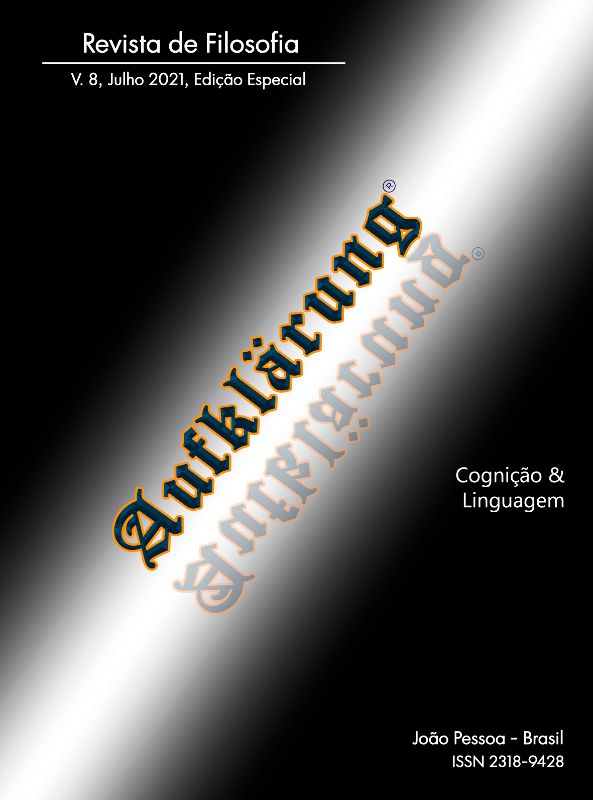Porque o segundo Wittgenstein não era um terapeuta
DOI:
https://doi.org/10.18012/arf.v8iesp.60023Keywords:
Wittgenstein, filosofia, terapia, mente, relações internas, relações externasAbstract
Wittgenstein ficou famoso por considerar a filosofia uma atividade e não um corpo de doutrinas. E, no entanto, na literatura secundária, há pouco acordo quanto ao que Wittgenstein considerou ser o propósito dessa atividade. Neste artigo, afirmo que o propósito da atividade filosófica, pelo menos de acordo com o segundo Wittgenstein, era resolver problemas filosóficos. Como suporte para essa afirmação, argumento que nossa conversa cotidiana sobre a mente nos apresenta um problema filosófico sobre a mente. Concentrando-me então no que Wittgenstein diz sobre a compreensão e usando de sua distinção entre relações internas e externas, mostro como podemos resolver esse problema. Se minha leitura for aceita, então o propósito da atividade filosófica, de acordo com o Wittgenstein posterior, não era terapia. Como tal, o segundo Wittgenstein não deve ser lido como um terapeuta.
Downloads
References
BAZ, A. Wittgenstein on aspect perception. Cambridge: Cambridge University Press, 2020.
CRARY, A.; READ, R. (Eds.) The new Wittgenstein. London; New York: Routledge, 2000.
GLOCK, H. A Wittgenstein dictionary. New York: Blackwell Publishers, 1996.
LOUGHLIN, V. Why enactivists should care about Wittgenstein. Philosophia, 2020. (Ahead of print) https://doi.org/10.1007/s11406-020-00286-3.
MACHA, J. Wittgenstein on internal and external relations: tracing all the connections. London; New York: Bloomsbury Academic, 2015.
MOYAL-SHARROCK, D. Wittgenstein’s razor: the cutting edge of enactivism. American Philosophical Quarterly, v. 50, n. 3, p. 263-279, 2013.
MOYAL-SHARROCK, D. The myth of the quietist Wittgenstein. In: BEALE, J.; KIDD, I. (Eds.) Wittgenstein and scientism. London; New York: Routledge, 2017. p. 152-174.
STERN, D. How many Wittgensteins? In: PICHLER, A.; SAATELA, S. (Eds.) Wittgenstein: the philosopher and his works. Frankfurt: Ontos Verlag, 2006. p. 205-229.
STROLL, A. Wittgenstein. London: Oneworld Publications, 2002.
SUSSWEIN, N.; RACINE, T. R. Wittgenstein and not-just-in-the-head cognition. New Ideas in Psychology, v. 27, n. 2, p. 184-196, 2009.
WITTGENSTEIN, L. Remarks on philosophical psychology - v. 2. Chicago: University of Chicago Press, 1988. (RPP II)
WITTGENSTEIN, L. Last writings on the philosophy of psychology: the inner and the outer, vol 2. London; New York: Blackwell Publishing, 1992. (LWII)
WITTGENSTEIN, L. Philosophical Occasions: 1912-1951. Edited by J. Klagge and A. Nordmann. Indianapolis; Cambridge: Hackett Publishing Company, 1993. (PO)
WITTGENSTEIN, L. Tractatus logico-philosophicus. London: Routledge, 2001. (TLP)
WITTGENSTEIN, L. Philosophical investigations. Oxford: Wiley-Blackwell, 2009. (PI)
Abbreviations for Wittgenstein’s works
TLP = Tractatus Logico-Philosophicus;
PI = Philosophical investigations;
PO = Philosophical Occasions;
LW II = Last Writings on Philosophical Psychology, volume 2;
RPP II = Remarks on Philosophical Psychology, volume 2.
Additional Files
Published
How to Cite
Issue
Section
License

This work is licensed under a Creative Commons Attribution 4.0 International License.
Journal general policy
1.This journal works under a Creative Commons License aplied to online journals. That icence can be read in the following link: Creative Commons Attribution 4.0 International (CC BY 4.0).
2.Accordingly to this License, a)the journal declares that authors hold the copyright of their articles without restrictions, and they can archieve them as post-print elsewhere. b)the journal allow the author(s) to retain publishing rights without restrictions.
Metadata Policy for information describing items in the repository
1. Anyone may access the metadata free of charge at anytime.
2.The metadata may be re-used in any medium without prior permission, even commercial purposes provided the OAI Identifier or a link to the original metadata record are given, under the terms of a CC BY license refered for the Journal.







































